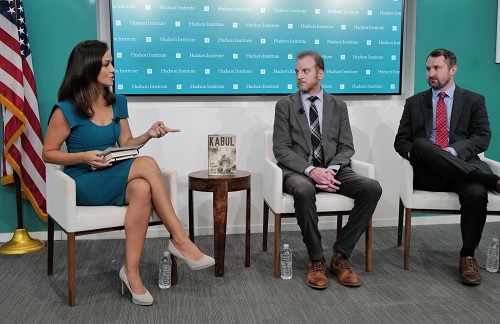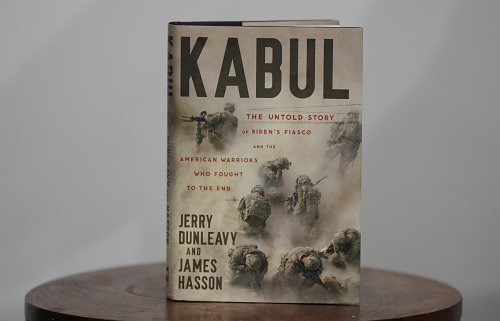
(Left to right): Rebeccah Heinrichs, Jerry Dunleavy, and James Hasson
Kabul: The Untold Story of Biden’s Fiasco & the American Warriors Who Fought to the End
By Elaine Pasquini
Photos by Phil Pasquini

Washington: During the US withdrawal from Afghanistan, on August 26, 2021, 13 American service members along with more than 170 Afghans were killed in a terrorist bombing at Abbey Gate outside Kabul’s Hamid Karzai International Airport. This became the third deadliest day for US forces during the entire two-decade war. The attack was preventable according to the authors of a new book, Kabul: The Untold Story of Biden’s Fiasco and the American Warriors Who Fought to the End.

On September 27, 2023, Hudson Institute senior fellow Rebeccah Heinrichs interviewed authors Jerry Dunleavy and James Hasson, who accessed key government documents and conducted eyewitness interviews on the political decision-making that led to the disastrous withdrawal, which left behind tens of thousands of Afghan translators and others who assisted the US during the 20-year war. Both authors emphasized that if this had been any other administration, they would have written the same book.
Dunleavy, a journalist and investigative reporter currently helping to lead the House Foreign Affairs Committee’s investigation into the Afghanistan withdrawal, spent months focused on the Taliban takeover, the fall of Kabul and the disastrous evacuation.
“Having the Taliban back in charge on the 20th anniversary of 9/11 was a strategic failure,” Dunleavy said. “We lost this war and the way that we lost it was a choice.”
Moving on from Afghanistan now, apart from being wrong from a moral standpoint, “allows us to make the same mistakes again,” he insisted. “This was not just a failure in Afghanistan, not just 20 years of war and 20 years of sacrifice going down the drain…but we live in a more dangerous world now.”
Making decisions in a haphazard sort of flippant way like we did in Afghanistan in 2021, where there is no accountability makes it easy for people to make the same mistakes again, Dunleavy said, and “we obviously can’t afford that in a world where you have Russia invading Ukraine and China getting ready to invade Taiwan.”
Asked about the effect our withdrawal had on Russia and China, Dunleavy responded that based on the evidence uncovered in their investigation “the debacle in Afghanistan was among the factors that encouraged Putin to launch his invasion of Ukraine….and this was a huge propaganda win for China… which continues to use our debacle in Afghanistan as propaganda specifically aimed at Taiwan.”
Hasson, a former Army captain and veteran of the war in Afghanistan who led evacuation efforts of Afghan allies and American citizens in August 2021, described the evacuation as “American people at their very best and the American government at its very worst.”
With respect to the US giving up Bagram, a strategically placed air base built by the Soviets that can project power all around southwest Asia in a country that borders China and is only 400 miles from China’s nuclear facilities, Hasson said that according to their research the administration never considered it as something that China would take over, which China is trying to do now.
One of the consequences of the decision to give up Bagram was the release by the Taliban of an ISIS-K fighter held in a prison there who became the suicide bomber at Abbey Gate. “We made the case that the attack was preventable because if we had just held Bagram, as recommended by military leaders, this man would have been behind bars,” he said. A number of prisons were located in Bagram which held about two thousand ISIS-K terrorists, dozens of al-Qaeda terrorists and thousands of Taliban fighters. When the Taliban took over Bagram, they freed all of the prisoners, allowing them back out onto the battlefield.
Dunleavy called the US abandonment of Bagram “perhaps the death knell of the Afghan Republic because Bagram was important for many reasons and giving it up was very foolish for many reasons.” It would have been a much safer place to do an evacuation from for a noncombatant evacuation operation (NEO) as opposed to Hamid Karzai International Airport in the middle of Kabul, as Bagram was an extremely defensible base, he said. “If we had done the NEO through Bagram, you never would have seen the chaos you saw there in Kabul.”
In addition, it would have been much more difficult for the Taliban to just “roll into Kabul if we had maintained a presence at Bagram and it would have been helpful for us to also continue to support the Afghan military out of Bagram,” he argued. “Closing Bagram was foolish…but it was a political decision. It was a decision driven by President Biden’s desire to get US troop levels down to an extremely low level.”
Asked to discuss US Marine Corps Sgt Tyler Vargas-Andrews who testified to Congress earlier this year that he had who he believed to be a suspicious individual matching the description of a suspected suicide bomber in his sights at Abbey Gate, but was denied permission to take the shot, Dunleavy responded: “That remains a big unanswered question for the Pentagon and what I will note is that CENTCOM very recently announced that they are reopening this portion of their investigation based on…testimony from Sgt Tyler Vargas-Andrews and other revelations that have occurred.” The 24-year-old suffered catastrophic wounds, losing his right arm, left leg and left kidney in the attack.
Going back to the subject of the Russian invasion of Ukraine and China’s increasing bellicosity against Taiwan, Dunleavy stated: “I don’t think that anyone can deny that two years later we do live in a more dangerous world than we were living in in 2021. Unfortunately, that strategic failure in Afghanistan did not stay in Afghanistan because our adversaries are watching and always looking to take advantage of things like this.”
(Elaine Pasquini is a freelance journalist. Her reports appear in the Washington Report on Middle East Affairs and Nuze.Ink.)

